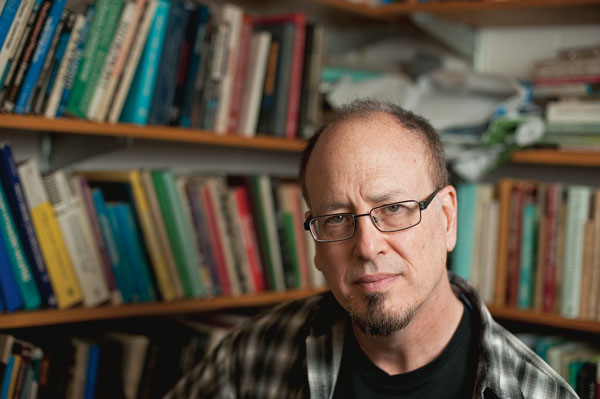In Review
 QUESTIONS: Long fascinated by the “big questions of philosophy,” economist Landsburg says he’s “finally gotten to a point
in life where I had something useful to say about them.” (Photo: Adam Fenster)
QUESTIONS: Long fascinated by the “big questions of philosophy,” economist Landsburg says he’s “finally gotten to a point
in life where I had something useful to say about them.” (Photo: Adam Fenster)In The Big Questions: Tackling the Problems of Philosophy with Ideas from Mathematics, Economics, and Physics (Free Press, 2009), Steven Landsburg ’74 (MA), a professor of economics at Rochester, takes an unconventional look at reality and unreality, knowledge and belief, and right and wrong. He discusses what it means to write about economics for a general audience and how other disciplines can help us think about philosophical questions.
What led you to write this book?
My whole life, I’ve been fascinated by the big questions in philosophy. I’ve periodically gone through stages of reading a lot of philosophy, and these are questions that have always been on my mind. I thought that I’d perhaps finally gotten to a point in life where I had something useful to say about them.
Are there philosophical questions mathematics, economics, and physics aren’t well-suited for grappling with?
Possibly. The questions I’ve chosen to think about are ones where these things are very applicable. It seems to me that if you think about anything hard enough, you’re going to find a way to apply the things you know to it.
What, if anything, for you best explains questions about the universe?
To me, the most plausible story—and I can’t possibly prove this is right—is that everything emanates from mathematics. There’s a fundamental sense in which mathematics is the fabric of the universe. It’s what everything is built out of. I expect that sounds strange and wifty if you haven’t read the book, but I hope that readers of the book will see that there’s a plausible, non-wifty sense in which that might be true, and it’s not at all inconsistent with the way mainstream physicists and mathematicians think about the world.
What do you think is key to making economics accessible to the general reader?
Constantly reminding oneself that the things that economists take for granted aren’t always taken for granted by everybody else—and realizing that even when an idea is very interesting, people aren’t going to read about it unless you find a way to make it fun. I take a lot of pride that my book The Armchair Economist (Free Press, 1993)—arguably the first of the pop economics books—is the book that economists give their mothers when they want them to understand what it is they do all day.
What are some things that economists take for granted that other people don’t?
First of all, that it’s very useful to think about extremely simple stories. When economists want to think about the implications of a free-trade pact, for example, they’ll often start by telling you a story about two people living on an island and trading with three people living on some other island, and working through carefully what happens when you open up trade in a situation like that. Most people react badly to that. They think that you are stripping away all of the important, real-world factors, whereas economists have learned—as I think all scientists have learned—that until you understand the simple stories, you’re never going to understand the complicated ones.
What would you say is a misconception about the field of economics?
That it’s all about money, or that it sets aside the actual desires of actual human beings, which is not just a misconception, it’s the exact opposite of the truth. The purpose of economics is to determine how it’s possible to fulfill the desires of actual human beings.
Is there something about the field that you wish could or would change?
No, I think it’s a pretty healthy field, actually. I think it’s mostly on track, and people are thinking about the right questions, and they’re thinking about them in the best ways that we can think about them. There are a lot of things that we need to think about better, and we haven’t figured out how to. But I think people are doing a pretty good job of making progress. A lot of things are understood now that weren’t 10 years ago—things like the extent to which monetary policy plays a role in business cycles and experimental data on what works in health and education policies, especially in poor countries. And a lot of things will be understood 10 years from now that aren’t today.

